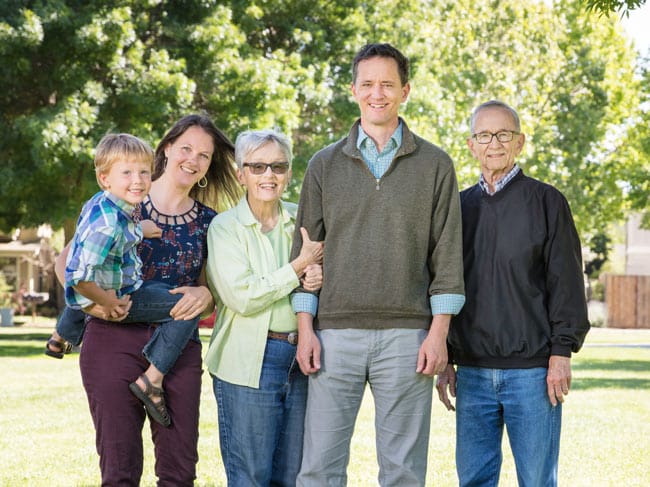Estate Planning Attorneys in Palo Alto
If you’re looking for a Palo Alto estate planning attorney, we have a team of them. As locally-based attorneys, we regularly speak throughout the Bay Area about estate planning for families with special needs children and complex family situations. We are experts at customizing trusts to suit the unique challenges your family may face. We further pride ourselves in continuing that service through probate and trust administration.

Estate Planning for Every Stage of Life
At Cookman Law, we understand that estate planning is a deeply personal journey that evolves with your life’s milestones. Whether you are starting a family, planning for retirement, or setting up long-term security for your children, our team of experienced attorneys in Palo Alto is here to
guide you through every step. We provide comprehensive estate planning services that ensure your wishes are respected and your family is protected, no matter what the future may hold.
Special Needs Planning Tailored to Your Family
Navigating the future for a family member with special needs requires thoughtful planning and a deep understanding of the legal tools available. Cookman Law provides dedicated support to craft a personalized plan that ensures stability and protection for your loved ones. Our goal is t to create a secure environment where special needs individuals can thrive, with resources and care plans designed to support their growth and well-being over the long term.


Trust Administration
Smoothly transitioning your legacy is our priority at Cookman Law. Our experienced attorneys guide you through the intricacies of trust administration with clear, strategic planning and compassionate execution. We ensure your loved one’s estate plan is honored and your family’s inheritance is protected and distributed as intended. Our services provide peace of mind during what can be a challenging time, allowing you and your family to focus on what truly matters.
Frequently Asked Questions
This is a protective trust for just about anyone. Like the SNT, this type of trust is irrevocable, and it can be set up as a stand-alone trust (while settlor is alive) or a testamentary trust (created from revocable trust upon settlor’s death). Typically the settlor is the parent of the beneficiary, and the beneficiary or a third party can act as trustee. Once funded, the trustee needs to obtain a tax ID number and file yearly income taxes.
This type of trust provides 3 major benefits:
- All assets held in the lifetime trust are not considered part of the beneficiary’s “estate” so they remain with the beneficiary if he or she endures a divorce – it’s like doing a prenup or postnup for your loved one.
- There is a high level of creditor protection for assets held in a lifetime trust, as long as the beneficiary is not acting as trustee of the trust
- When the beneficiary dies, assets held in the trust pass to the beneficiary’s children free of estate taxes. Because of this, these types of trusts are also called “GST” (or Generation-Skipping Transfer) Trusts.Unfortunately, you cannot set up a lifetime trust for yourself or your spouse in California – it is more difficult to do this type of planning (called “asset protection planning”) in California. If interested, you can set up a Dynasty Trust in another state that offers more relaxed laws on asset protection, such as Nevada, Alaska or Delaware
This is a protective trust for a disabled person. A SNT should be irrevocable, and can be set up while the settlor is alive (a “stand-alone SNT”) or it springs into being upon the settlor’s death, from the revocable living trust (a “testamentary SNT”). The settlor and initial trustee is typically the parent or other family member, and the beneficiary is the disabled person.
The main purpose of a SNT is to protect needs-based public benefits for the disabled beneficiary. All of the assets held in the trust are for the benefit of the beneficiary, but the beneficiary cannot change the trust or act as trustee. Because someone else besides the beneficiary has control over the trust assets, the assets in the trust are not considered the beneficiary’s countable assets for public benefits purposes, and the beneficiary can continue to qualify for benefits such as SSI and Medicaid (Medi-Cal in California).
A stand-alone SNT is usually set up with a minimum amount in it, say $10. This is called a “seed trust”. Once the trust is “funded”, that is, substantial assets are transferred into the trust, the trustee needs to get a tax ID number and start filing fiduciary income tax returns.
This is the cornerstone of most estate plans in California. This type of trust can be changed or amended at any time (it’s “revocable”) and it’s set up while the settlor is still alive (it’s “living”). Typically, the people setting up a revocable living trust play all 3 roles: they are the settlors, the trustees, and the beneficiaries!
The main purpose of an RLT is to avoid probate. Assets held in an RLT pass upon the settlor’s death as described in the trust, and the named successor trustee takes over management of the trust. Thus, the assets in the trust don’t need to go through the probate court process. The RLT is also good for management, particularly if the settlor isn’t able to act as trustee – it is relatively easy for the named successor trustee to take over management of the assets held in the trust.
This type of trust is also the simplest type of trust out there. Because the trust is revocable, and the same person is acting as settlor and trustee, you don’t need to get a separate tax ID number or file income taxes – the settlor’s social security number is used to report any income generated in the RLT
We love working as a team at Cookman Law. At least 3 sets of eyes look over each set of documents before they go out the door: one of our drafting paralegals (Catarine Datora & Megan Orsini), our associate attorney (Hannah MacLeod & Amiee Lee), and Ellen. Hannah and Amiee are both available for questions when Ellen is out.
No, we don’t assist with public benefits applications. But we are happy to refer you to folks who do help with this!
Special Needs Trusts are useful if your child is receiving needs-based public benefits (ie Supplemental Security Income and/or Medi-Cal), and/or if they need assistance managing assets, even if they’re not receiving such public benefits.
About one-half of our estate planning clients have special needs issues in their families.
We typically charge a flat fee for all work done. After our initial appointment (when we get a better idea of what needs to be done) we will quote a flat fee, and we collect the full fee at that time. We accept credit cards and checks. We deposit the full fee into our IOLTA trust account (owned by the California State Bar), and transfer the fee into our operating account after we send you the draft documents.
We do not offer free initial consultations.
Yes!! We love working with other professionals, and we welcome them to join our meetings if you are comfortable with it.
No, we do not act as trustee of trusts; instead, we advise trustees of trusts, particularly after the settlor of a trust has died – this process is called Trust Administration. We are happy to introduce you to banks and private professional fiduciaries that act as trustee.
Ellen graduated from UC Berkeley School of Law in 2003 and has been practicing estate planning (with an emphasis in special needs planning) since 2008. She started Cookman Law, PC in 2015.
For estate planning, the entire process can take as little as 2 months total – a lot of it depends on when we hear back from you on necessary decisions. Trust administrations and conservatorships tend to take 4-6 months.
Ellen or Hannah (our associate attorney) will have a call with you to discuss your goals, dive into your planning needs, answer your questions, and quote a hard fee for all of the planning. Our team then drafts the documents and sends them to you for your review, along with a flow chart and videos walking you through the documents. We then have a follow-up call with you to answer questions and fill in any blanks. Then we schedule a Remote Online Notarization appointment or an in-person notarization appointment. Hannah and Amiee are both available for questions when Ellen is out.
We very much appreciate the trust that you put in us, but unfortunately, this is not something that we handle anymore. However, we’re happy to provide recommendations to other attorneys who do a great job with limited Conservatorships.
